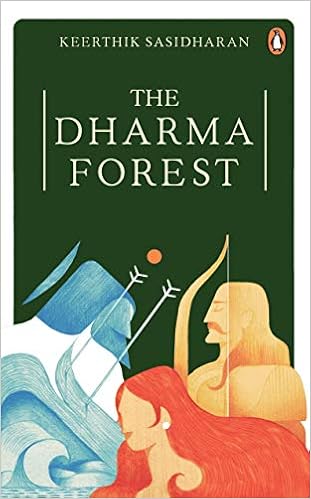
The Dharma Forest by Keethik Sasidharan
Keerthik Sasidharan is an incredibly erudite Indian economist who works in the US and who has somehow managed to work full time, read so much AND write the first volume of a planned trilogy about the Mahabharata. The idea is that he will retell the Mahabharata through the eyes of 9 of its main characters and each segment will also bring out one aspect of the 9 rasas of ancient Indian philosophy. A general familiarity with the Mahabharata is helpful before you can read this, because the author does not provide you with a roadmap before you begin. But as long as you have that basic familiarity, you should be able to read and enjoy this book.
The first book introduces us to Bhishma, Draupadi and Arjun. The book is over 500 pages, so each character gets a lot of room to express themselves. And express themselves they do, in a very philosophical and subtle book that raises (and sometimes answers) profound philosophical questions while telling what is ostensibly a war story (one can say the same thing about the original Mahabharata). But be aware, just like the original, this IS a war story, and no detail is spared. At first glance some readers may look at that and decide this is just too much detail, but again, as with the original, patience is rewarded; The philosophical, psychological and sociological insights are scattered within, and worth the time spend reading the details of the war, the weapons and the stratagems.
The author’s greatest achievement is his ability to render the actions and motivations of these ancient characters in terms a modern reader can grasp. The actions and choices made by the various actors in this drama can appear mystifying in the original, but Keerthik is able to stick to the original story (and even the original phrases) while making them fully comprehensible to us. For example, the story of Amba and her kidnapping and subsequent rejection can seem very foreign and strange in other tellings, but in this book you can almost understand why every character acts the way they do. That is a tremendous achievement. Well worth a read.
You can read an extended excerpt here.
PB Mehta has a good review here.
We Interviewed Keerthik for a podcast last year: